Film Name:黑豹 / Black Panther
The public’s “craving” for Hollywood blockbusters over the past month has finally been satisfied this weekend with the release of “Black Panther.” The film’s strong opening was also fueled by two key factors: glowing reviews from international media and mixed word-of-mouth from general audiences, which sparked greater curiosity among moviegoers eager to see it for themselves.
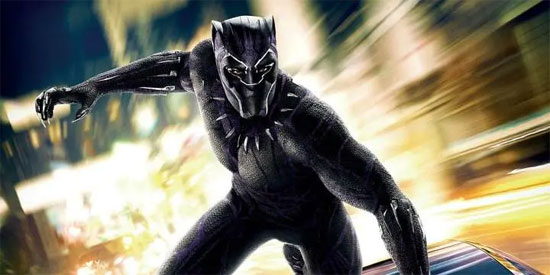
To be fair, “Black Panther” is an exceptionally well-executed action-sci-fi Marvel film. Yet its hollow core means it doesn’t quite deserve all the praise… As for the most critical factor—freshness—it’s not just Marvel films; every genre faces this same challenge.
[Friendly reminder: Spoilers ahead.]
First and foremost, we must commend “Black Panther” as a meticulously crafted and deeply thoughtful film. It achieved numerous ‘firsts’ in many areas—such as revolutionizing the portrayal of Black communities—while also meticulously developing the original African nation of Wakanda, masterfully blending and refining its associated “subcultures” to perfection.
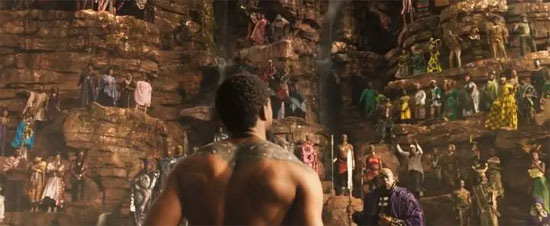
The fictional Wakanda embodies the essence of African culture, from its king and chieftains to its streets and alleys, all brimming with exotic charm: Disc-shaped headdresses, golden neck rings, draped blankets, oversized lip plates, war dance masks, and vibrant, symbolically rich tattoos (and facial markings)—alongside locally inspired yet innovative scripts, languages, and music…
The visual details of Black Panther withstand the scrutiny of the most meticulous researchers.
The abundance of African folklore set against a futuristic utopia brimming with technology creates a striking and undeniably captivating visual experience.
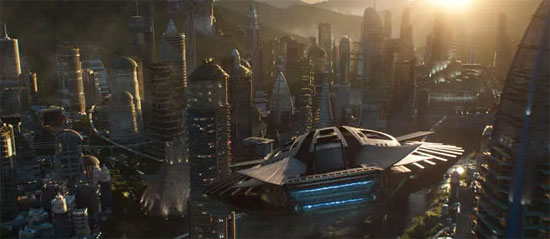
By this point in the Marvel Cinematic Universe, nearly every genre element has been explored: tech tycoons, political thrillers, comedic antics, mythical time-travel, teen campus dramas… This installment delivers an explosive blend of African futurism + cyberpunk reimagining + retro-style prince’s revenge tale. If nothing else, the sincere effort to innovate is commendable.
The film’s strengths are undeniable, so let’s focus on my personal disappointments and gripes.
The action sequences present a subtle yet noticeable weakness. On paper, the vibranium armor, Black Panther’s gymnastic moves, and futuristic weaponry should make “Black Panther” a visual feast…
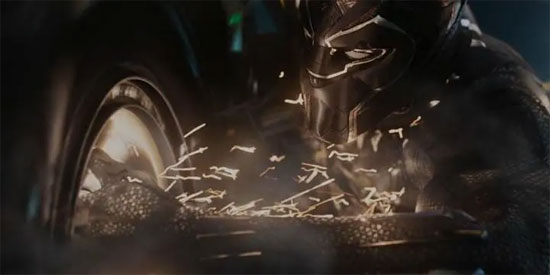
However, T’Challa, the Black Panther, had already made his debut in Captain America: Civil War, where he stole the show with his grand entrance. Consequently, an even more spectacular action sequence became an unspoken expectation for his solo film. Even if it matched the quality of Civil War’s action, it would still be seen as a shortcoming for Black Panther.
This is a minor disappointment, at worst diminishing the audience’s sensory enjoyment (importance varies by individual). For me, the more fatal flaw is the bizarre sense of extreme imbalance in Wakanda’s world-building.
On the surface, Wakanda seems sufficiently advanced, right?
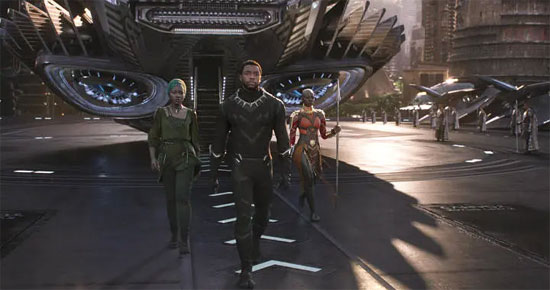
Leveraging its unique mineral resources, it has carved out a secluded paradise on the African continent, establishing a technological civilization that leads the world by an entire era—a true superpower of the first world.
Yet within this advanced nation, primitive and backward customs persist everywhere—dress styles, ethnic attire, sacrificial rituals, and more are designated as (intangible) cultural heritage. These cultural icons proudly proclaim, “The more ethnic, the more global.” The succession system for the head of state alone instantly transports one back centuries.
Indeed, Wakanda’s throne succession prioritizes bloodline over meritocracy—it is hereditary, not earned through merit…
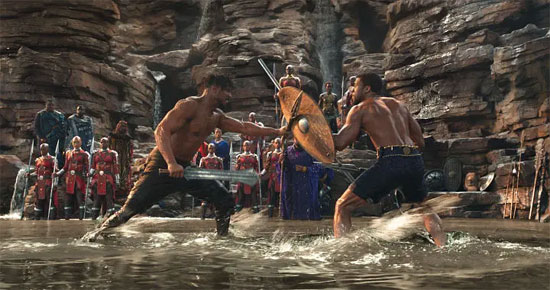
Of course, royalty cannot be incompetent, and others may challenge them in rituals. But with such advanced technology, why do they still compete through bare-knuckle combat? Even if respecting a “martial tradition,” retaining the victory condition of “killing your opponent” feels jarringly out of step with modern civilization (akin to losing an election potentially costing one’s life).
On one hand, it’s extremely advanced; on the other, it’s profoundly backward. Within this discordant context, Wakanda presents more as an unrealistic utopian fantasy than a refreshingly inspiring vision.
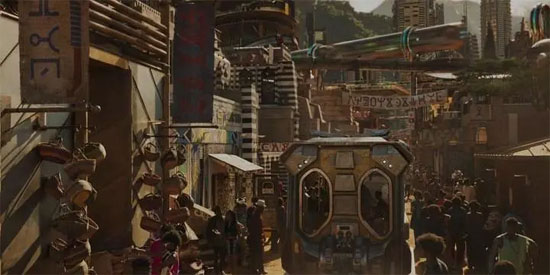
In truth, the film handles the dilemma of national development choices quite skillfully: Should Wakanda adhere to centuries-old traditions, continuing to prosper in isolation? Or should it embrace the global trend of “One World,” opening up to play a more significant role? If revealing its true self to the world, should it first throw a hard punch or display an open, magnanimous heart?
Upon reflection, T’Challa’s final choice proves profoundly wise. In an ever-evolving world, isolationism inevitably leads to stagnation. Proactive, positive engagement with the outside world aligns far more closely with Wakanda’s practical realities.
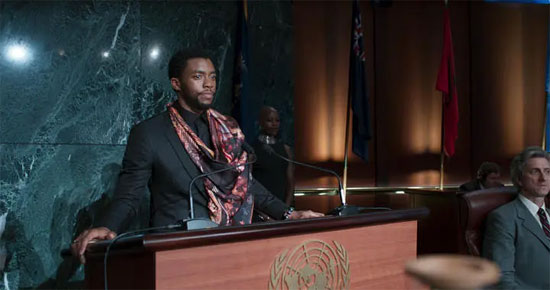
But in my view, Wakanda’s final display of “political correctness” always fell a bit short. The imbalance in its setup mentioned earlier is just one aspect—more importantly, what exactly can Wakanda “export” to the world?
Probably only vibranium and related technologies.
In reality, Wakanda’s prosperity relies 99.9% on a “cosmic gift” from long ago. Every advanced weapon, tool, and technological invention hinges on vibranium—meaning Wakanda is fundamentally just a resource-dependent nation, no different in essence from oil-rich nations (albeit exceptionally efficient). Once its unique resource is depleted, it will inevitably face depletion.
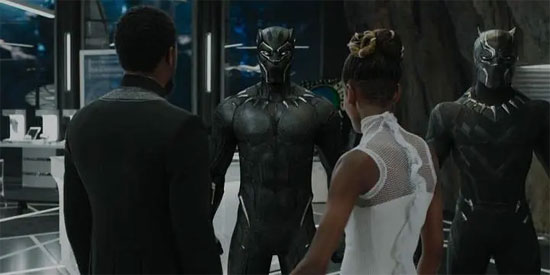
Thus, from another perspective, Wakanda’s decision to open up could be seen as a “historical choice”…
This is a perspective worth exploring in depth, but Black Panther’s attempt in this regard can only be described as superficial. The motivations behind the debates among Wakanda’s elite over “opening up” remain largely rooted in personal greed, hatred, and tradition, lacking a more long-term vision.
In a film entirely carried by its Black cast, the attitudes of outsiders toward the real Wakanda also offer a compelling entry point. Characters like Klaw and Agent Ross, two white figures, perfectly embody the dual human responses of greedy covetousness and skeptical curiosity.
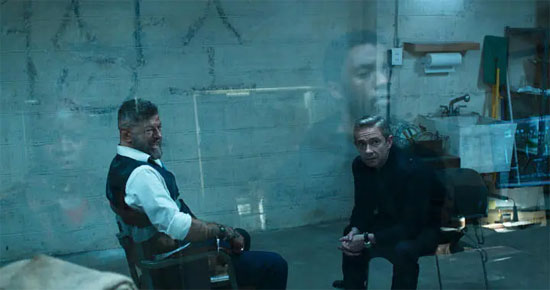
Unfortunately, the film feels somewhat underdeveloped on this front. Killmonger is killed by Erik midway through the story, effectively serving as a sacrificial offering. Meanwhile, Ross, after entering Wakanda, behaves far too by-the-book, wasting his CIA agent credentials.
However, what I find most regrettable is the portrayal of the father-son “relationships and legacies” between T’Chaka and T’Challa, and N’Buchu and Erik.
After ascending to the throne, both T’Challa and Erik consumed the heart-shaped herb to commune with their fathers. Beyond the tangled web of grudges and conflicts, one detail struck me deeply: When T’Challa expressed longing for his father, T’Chaka remarked, “A son who can’t let go of his father is a failure as a father.” When N’Buchu asked his son if he missed him, Erik responded with resignation, “All mortals must die.”

This implies that in the eyes of the previous king and prince, their nephew’s persona more closely aligned with their original expectations for their son.
Extending this further, while the elder King T’Chaka steadfastly upheld Wakandan traditions, he decisively executed his own brother, embodying ruthless decisiveness. Conversely, the undercover N’Bujola, though plotting the grand scheme of “Black brothers rising to become masters,” was fundamentally gentler and more sentimental at heart…
The contrasting psychologies and worldviews of these two royal generations could have formed the deepest, most thought-provoking core theme of Black Panther. Yet the film ultimately glosses over this, wrapping things up with a laugh and a slap on the wrist.

To draw an analogy, Black Panther is like a new dish introduced at the “Marvel Feast.” The ingredients are fresh and unique, and considerable thought has gone into the knife work, oil selection, and plating. Yet the cooking process amounts to little more than a quick stir-fry before serving, failing to bring out the dish’s full potential flavor. While not exactly unpleasant, regular diners at the Marvel banquet inevitably find it lacking depth.
This highlights a challenge facing Marvel films—and indeed all genre cinema—that cannot be ignored: audience fatigue.
Had Black Panther been a truly fresh take akin to Marvel’s first-tier “new films,” it might have resonated far more deeply with viewers… But as the novelty wears off, achieving broader and more consistent acclaim requires either breaking the mold to reach new heights in genre craftsmanship (like Captain America 2) or staging bigger, louder, more spectacular spectacles—flooding the market to capture attention. So, until we meet again in The Avengers 3.
Please specify:Anime Phone Cases » Black Panther 黑豹 2018 Film Review: The audience’s greatest “enemy” is novelty.